HP Phoenix h9-1120t System Review: HP's Gaming Desktop Round Two with Tahiti and Ivy Bridge
by Dustin Sklavos on June 19, 2012 8:15 PM EST- Posted in
- Systems
- Gaming
- AMD
- HP
- Ivy Bridge
- Radeon HD 7000
- Phoenix
- Tahiti
Application and Futuremark Performance
While I found the HP Phoenix fairly compelling on the first go, things are more difficult this time around. The Phoenix gets a small boost from Ivy Bridge, but our review unit is running off a single mechanical hard disk where most other review units we've received have enjoyed SSDs. That's going to cause the PCMark scores to take a hit. Naturally, you can add your own if you'd like, but that's another $200 or so for 240GB+ SSDs.
The other hit is going to be in the overclock, or lack thereof. The Phoenix has no overclock of any kind on the otherwise overclock-friendly i7-3770K, making the liquid-cooling for the CPU feel more for show than anything practical.
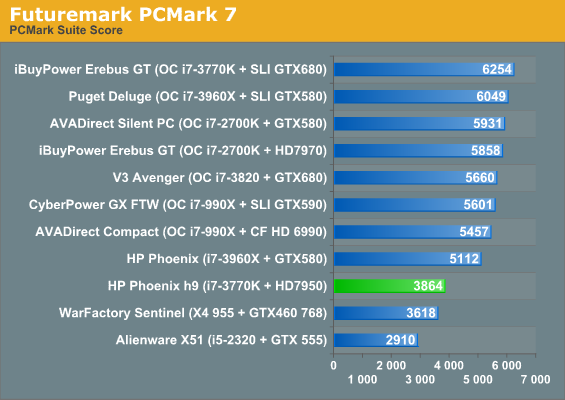
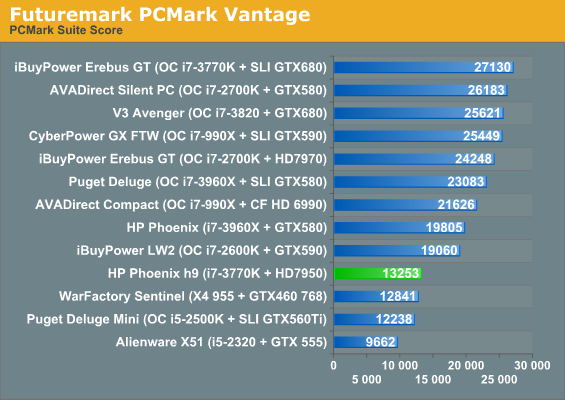
Without an SSD or an overclock, the Phoenix h9 flounders to near the bottom of the pack. Yet we know that PCMark skews heavily towards SSDs, so let's see what happens when we shift the focus to more CPU-oriented tasks.
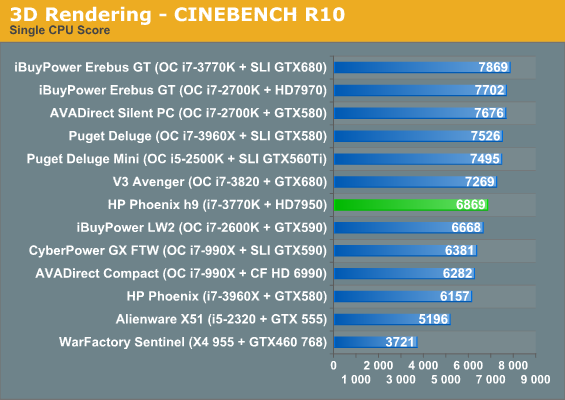
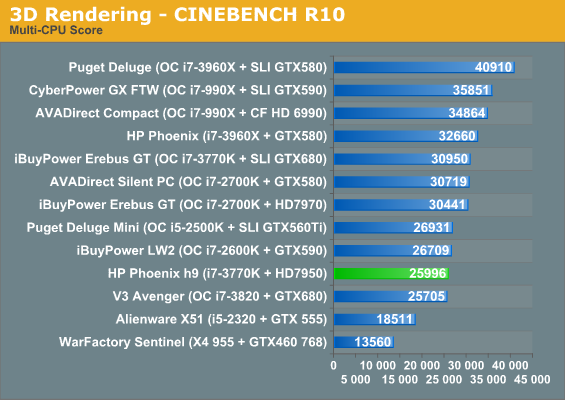
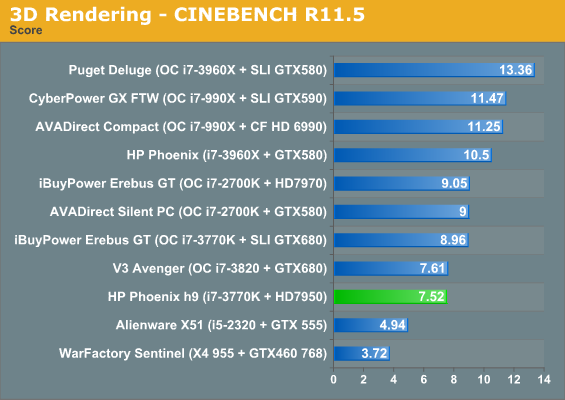
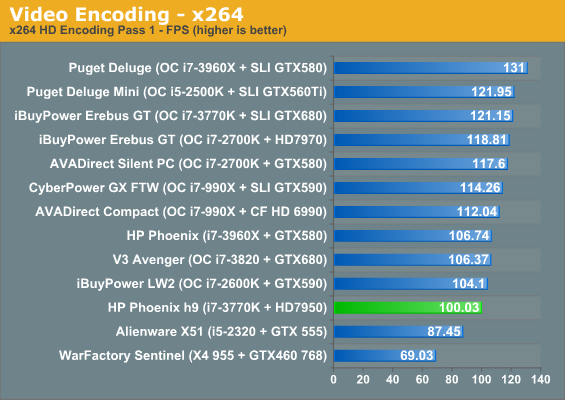
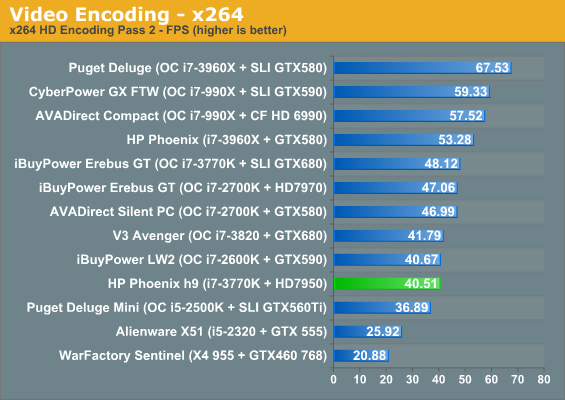
Without any kind of overclock, the Phoenix h9 puts in a very weak showing compared to our other gaming desktops. Note that boutiques charge a very small fee to overclock the systems they build, but that fee results in a tangible performance improvement that was also in some cases even measurable in gaming scenarios.
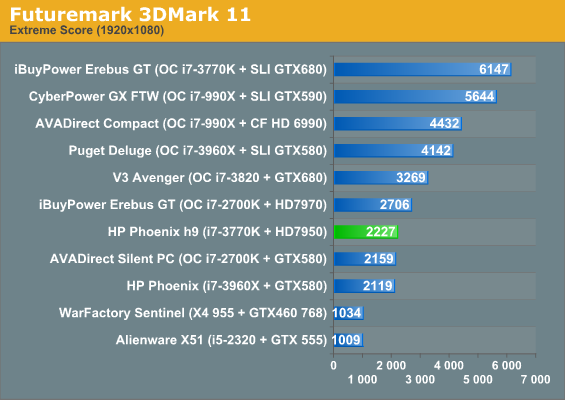
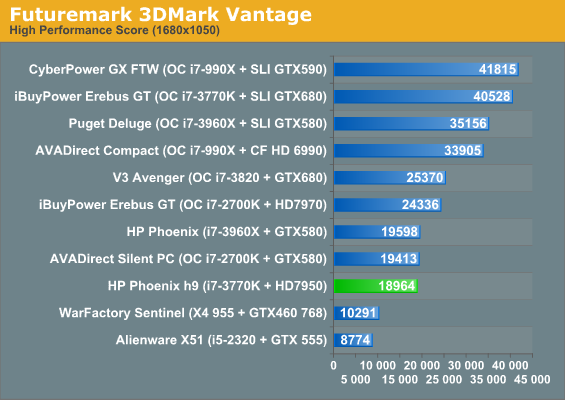
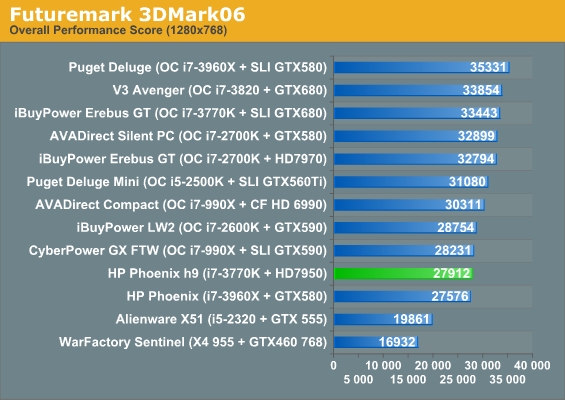
I want to be more forgiving of the Phoenix h9 in gaming scenarios where it's often competing with multi-GPU solutions, but it has a hard time breaking away from even a single last generation GeForce GTX 580. Keep in mind that the Radeon HD 7950 is as fast as any of the Phoenix models will get, too, due to the thermal constraints of the small chassis. Hopefully real world gaming benchmarks will be kinder....










33 Comments
View All Comments
flamethrower - Tuesday, June 19, 2012 - link
A pre-built micro-ATX based performance system. To me this means $800 to $1500 excluding monitor. Enthusiast systems like this don't interest me much.Have I been missing your coverage of this type of system? Should I look at laptops if I only need a performance-class system?
cashkennedy - Tuesday, June 19, 2012 - link
So this pre-built , micro-atx equivalent (same size) performance system that ranges from 1000-1700 clearly has nothing in common with what you are interested in...What do you mean by performance class? Cause you can order this with a crap video card for 999 and it would no longer be a gaming class if thats what you consider this...
ImSpartacus - Tuesday, June 19, 2012 - link
I think he's referencing the argument that OEMs should play to their strengths and not try to compete with homemade systems.Enthusiasts can easily make cheap, tweakable, expandable performance-first systems. OEMs have no chance of seriously competing in that space.
But OEMs CAN appeal to the enthusiast by providing a product that the enthusiast cannot get anywhere else. Machines like the Alienware X51 and almost every mini-ITX HTPC are examples.
flamethrower is asking for something in the middle.
Etern205 - Wednesday, June 20, 2012 - link
One area DIY can't compete to OEM is the OS. If someone can only spend $1000 on a gaming build, then shelling out $100 means, they will have to get a less powerful graphic card, not like a GTX 670 or HD7950.BTW, I tried to configure a simlar PC from newegg to as close as possible the system review in this article, and total comes out to $1,530, and that also includes the OS.
bah12 - Wednesday, June 20, 2012 - link
Keep in mind that Microsoft's OEM license for $99 is not legal to use on your own machine. Load's of us do it, but from a strictly legal perspective using an OEM licence on a DIY build is not compliant with the terms of the licence. The only licence Microsoft sells for a "naked" PC is full retail, so in reality you should price in a $299 OS not $99. But who's going to do that really :)Einy0 - Wednesday, June 20, 2012 - link
You are somewhat correct in that notion, the license clearly states that an OEM license is for a new PC and must be sold to a third party. It purposely does not place other obstructions on the license, in order to allow knowledgeable PC people to build systems themselves for reasonable licensing fees. If they did not intend this they would make more restrictions on the license. An example would be the "system builder" would need to a be a qualified and licensed business or employee of such a business. Legally, I could have my wife purchase the software, install it on a new PC and sell it to me for $1. The key restriction here is the software lives and dies with the PC. Microsoft considers the motherboard to be the key item in that transaction and even then there are concessions for failed components.From MS Licensing:
e. To distribute the Software or Hardware in this Pack, you must be a System Builder
and accept this license. “System Builder” means an original equipment manufacturer, an assembler, a refurbisher, or a software
pre-installer that sells the Customer System(s) to a third party.
Pricing the OS at $299 in a complete system build would
be just plain idiotic. If MS enforced $299 an OS, they would kill their market overnight! People would find alternatives quickly...
Zink - Tuesday, June 19, 2012 - link
To me a performance system would need an SSD and this case is about 2" higher than other mATX systems because of the non-standard power supply and case design.If performance-class means mediocre gaming ability then I think a laptop is a great way to go. Intel quads hit 3.5Ghz and have 80% of the performance of the quad desktop i7s.
flamethrower - Wednesday, June 20, 2012 - link
You cannot edit your posts on here. I got distracted by the lead-in about the $2900 system. This is a midrange system after all.bigboxes - Wednesday, June 20, 2012 - link
Maybe you should RTFA next time before giving a knee-jerk response.JeBuSBrian - Tuesday, June 19, 2012 - link
How is it that the mainstream system builders always seem to make their gaming rigs so fugly?